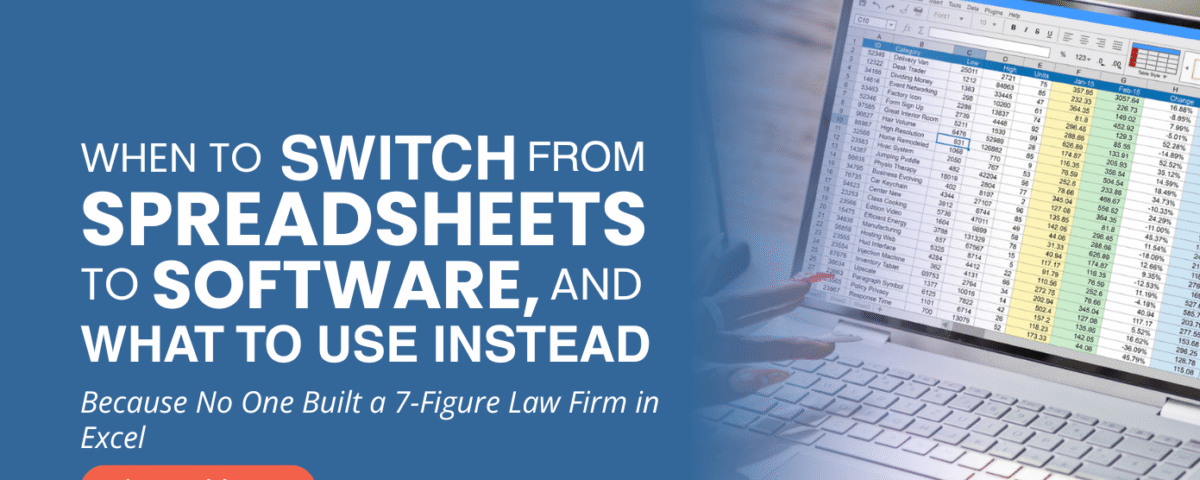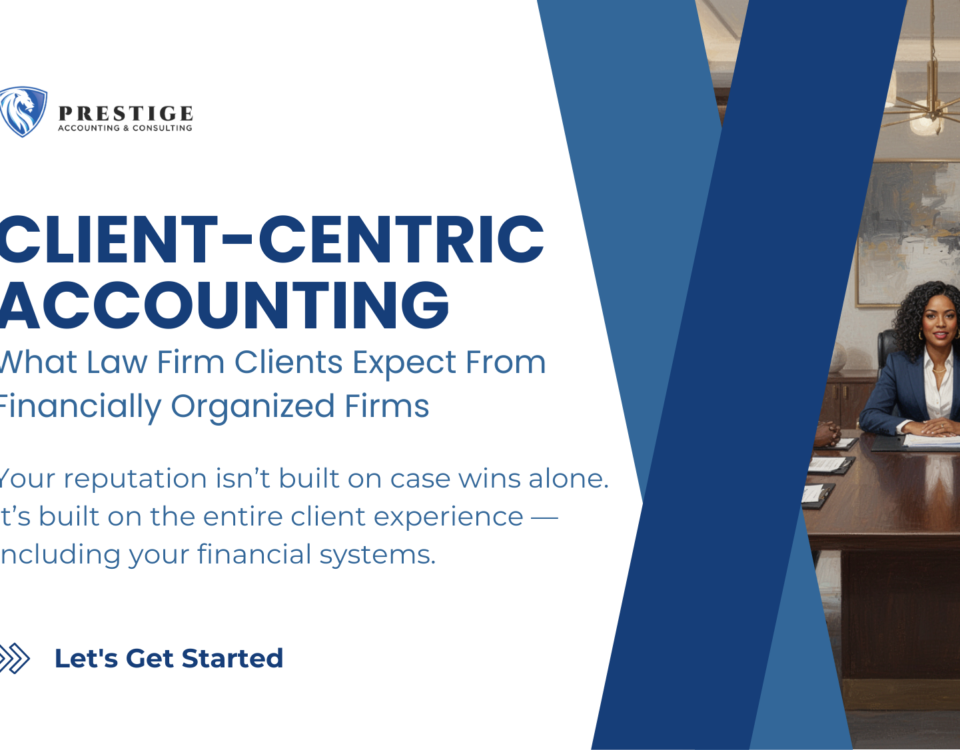
The Hidden Costs of Manual Billing and Bookkeeping
September 18, 2025
Profit Pillars 2025
September 30, 2025When to Switch from Spreadsheets to Software—and What to Use Instead
Because No One Built a 7-Figure Law Firm in Excel
Spreadsheets are the Swiss Army knife of small business. They’re cheap. Familiar. Flexible. And in the early days of your law firm, they probably got the job done.
You tracked expenses, logged revenue, maybe even cobbled together a P&L when tax time rolled around. It worked—until it didn’t.
If you’re reading this, there’s a good chance your spreadsheets are no longer supporting your firm. They’re slowing you down, hiding mistakes, and keeping you from seeing the bigger financial picture.
So let’s talk about when to break up with spreadsheets—and how to choose the right software that will actually make your firm run smoother.
The Illusion of Control
One of the main reasons law firm owners stick with spreadsheets is the feeling of control. You can see every line. You can change every formula. You can customize it endlessly.
But that control comes at a cost:
- Every cell is a potential point of failure
- Manual entry increases the risk of error
- Reconciliation is time-consuming and inconsistent
- There’s no audit trail to catch mistakes
- There’s no automation—only repetition
In truth, spreadsheets give you the illusion of control—while silently creating blind spots that grow as your firm grows.
Warning Signs You’ve Outgrown Excel
You don’t need to hit a specific revenue benchmark to justify better tools. You need to hit a capacity ceiling. Here are the real-world red flags:
- You’re late invoicing clients because billing “takes too long”
- You’ve caught mistakes in trust reconciliations (or haven’t checked)
- You’re unsure which practice areas are profitable
- Your CPA or bookkeeper is constantly asking for clarification
- You’re manually copying numbers between tabs or programs
- You’re avoiding financial reports because they’re hard to build
- You don’t trust your numbers when making hiring or draw decisions
If even two of those apply, it’s time to stop duct-taping your financials together and implement a proper system.
The Real Cost of Staying Manual
Spreadsheets may feel free, but they’re expensive in hidden ways.
You’re burning time that could be billed. You’re exposing yourself to compliance risks, especially with trust accounts. And you’re making strategic decisions without reliable data.
In our work with law firms, we often find:
- Missed deductions due to untracked expenses
- Duplicate payments or deposits
- Invoices sent to the wrong clients
- Underbilling due to forgotten time entries
- Funds improperly deposited into the wrong account
These aren’t “rookie” mistakes. They’re spreadsheet mistakes. And they cost real money—often silently.
What Software Should You Use Instead?
Now that you’re ready to move on, here’s where we recommend starting.
For Core Accounting: QuickBooks Online (QBO)
This is the backbone of your financial system. It integrates with most legal billing platforms, supports IOLTA tracking (with proper setup), and gives your CPA access in real time. We customize the chart of accounts to reflect your actual operations—not some generic law firm model.
For Practice Management & Billing: Clio Manage
If you’re already using Clio, great—just make sure it’s set up right. If not, Clio Manage offers time tracking, billing, document management, and trust account workflows in one place. It pairs beautifully with QBO for reporting and reconciliation.
For Payments: LawPay
Accepting payments is easy. Accepting them compliantly is the hard part. LawPay ensures trust and operating funds go where they belong, with no risk of commingling or ethics violations. It’s bar-approved in most states.
For Intake and Client Workflows: Lawmatics
These tool let you automate intake forms, fee agreements, follow-ups, and more. The result? A client experience that’s seamless—and a billing process that doesn’t fall through the cracks.
For KPI Dashboards: LivePlan or Fathom
If you’re ready to get serious about financial metrics, these tools turn raw data into real-time dashboards. But they only work if your accounting system is clean—so get that right first.
Software Is Not the Goal. Clarity Is.
The best software in the world won’t help if it’s built on bad data or implemented without a strategy. That’s why at Prestige Accounting and Consulting, we don’t just recommend tools—we help you:
- Choose the right stack for your firm’s size and needs
- Set it up properly for trust accounting and tax compliance
- Build workflows your team will actually follow
- Create dashboards that show you what’s working and what’s not
Because software isn’t the goal. Financial clarity is.
📅 Book your free consultation and we’ll help you map out a smarter system—no more spreadsheets required.




